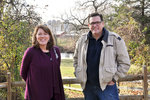Clear, 74°
Wind: mph,




Kawsar Nakhtar was celebrating his birthday at Oriole Park at Camden Yards this past baseball season when the 26-year-old Afghan refugee could be seen running excitedly up the steps clutching something in his hands.
Nakhtar had caught a ball.
Although Nakhtar has plenty of hardships to occupy his mind — his wife, son and 6-month-old girl didn’t make it out of Afghanistan with him during the evacuation — he was able to flash the brightest of smiles and share in the most American of joys by catching a baseball on his birthday at a major league game.
Heart For Refugees is a local nonprofit organization that’s spearheaded by members from Severna Park, Arnold and Annapolis. The group started as the BWI Afghan Welcoming Coordination Efforts and expanded from there. Their mission is to assist the refugee and asylum-seeking community to find hope and friendship as they re-establish their lives in the U.S.
Nakhtar is one of the almost 84,000 Afghan nationals who have resettled in the U.S. as part of Operation Allies Welcome. On August 29, 2021, the Department of Homeland Security was directed to lead and coordinate efforts across the federal government to support vulnerable Afghans, including those who worked alongside the U.S. in Afghanistan for the past two decades, as they safely resettle in the states. According to the State Department, more than 5,900 Afghan refugees have landed in the tristate capital region as part of those efforts.
“The majority of all the refugees that are here have served our military,” said Jeanette Middleton-Sudano, who is a part of the Heart For Refugees leadership team.
Middleton-Sudano was one of several Severna Park women who met hundreds of Afghan refugees at Baltimore/Washington International Thurgood Marshall Airport earlier this year to assist with material needs and to develop friendships while the refugees awaited more permanent housing arrangements.
The group grew and transformed into Heart For Refugees where Sudano and her crew strive to assist refugee families with safe and affordable housing and transportation, jobs, health care, school enrollment and everyday challenges.
Heart For Refugees now supports more than 50 refugee families with family support teams.
Severna Park resident David Heemstra formed one of those support teams along with his friends. Heemstra’s team “adopted” Nakhtar and two other families, who are now residing in homes in Catonsville, Maryland.
“We just want them to be self-sufficient people that can take care of themselves,” Heemstra said.
During the initial stages, Heemstra was handing out food at BWI, and the retired Air Force senior master sergeant found common ground with many refugees.
“I started talking to the people that spoke English, and as soon as they found out I was prior military, all the sudden there’s like a bond right there,” Heemstra said.
Heemstra also served as a pilot for Atlas Air and retired from flying the day evacuations from Afghanistan started in August of last year. Heemstra now works at the airline’s command center, and that’s where he was during the evacuations. Although the U.S. military handled evacuation flights out of Kabul, Atlas Air handled some of the next legs from locations in Europe and the Middle East.
“I was involved in a lot of the behind-the-scenes stuff,” said Heemstra, recalling one event on a flight out of Bulgaria where flight attendants had to conduct life-saving measures on an Afghan woman who suffered a heart attack on the flight.
One of Heemstra’s Afghan families that he’s assisting is composed of Samarulla; his wife, Ashrifa; and their 10-year-old son, Nasimulla. Samarulla worked as a security officer for the U.S. Embassy Annex, which was located south of Kabul. Because of Samarulla’s affiliation with the U.S. government, the Taliban attempted to murder him multiple times. Although Samarulla escaped the assassination attempts, his uncle and good friend were not as fortunate.
Heemstra cited a recent example on how the transition can be difficult for the refugees. On a visit to obtain his driver’s license, Samarulla pushed the wrong button and was granted a student license instead of a regular one. It took several visits to the Department of Motor Vehicles by Heemstra to sort it out and allow Samarulla to get the license he’s required to have to work.
“It’s a lot to navigate,” Middleton-Sudano said. “I just don’t know how people do it if they don’t have someone helping them out.”
Between Google meetings, texts, visits, events and language apps, there’s a lot for teams and refugees to sort through.
“I just want to be a good person and help people out when I see it,” Heemstra said. “I think that’s the definition of compassion … you see a need and then you do something about it.”
Heart For Refugees relies not just on volunteers to lead teams, but the group also receives donations from individuals and local entities such as churches and food banks. Severna Park dentist Dr. David Deitrick even provided free dental work for many of the families that Heemstra assists.
“Community support is integral to helping refugees adapt to their new homes,” said a State Department spokesperson.
Middleton-Sudano said that Heart For Refugees is also supporting some families that don’t have a full team of support yet. She’s hoping more volunteers will come on board or form family support teams because those with teams are faring much better than the families without them.
“There’s been a lot of stories … bad stories, good stories,” Middleton-Sudano said. “I just try to focus on the good stories, because otherwise you’d cry all the time.”
Middleton-Sudano left out funny stories in that statement. She relayed a recent language translation moment that left her chuckling.
One of the refugees she’s assisting sent her a message requesting a cannabis cutting machine. After some initial confusion, she realized he has a yard and may be looking to cut a different kind of grass. She sent him a picture of a lawn mower, and he said “yes.”
Recently, Middleton-Sudano saw a 24-year-old Afghan refugee who was supposed to be in class at a community college in Baltimore County. The woman explained to Middleton-Sudano that she didn’t have a book to go to class because it was too expensive. Middleton-Sudano got her in the car and purchased the needed book.
“She sat on the floor sobbing with thanks,” Middleton-Sudano said. “That’s her gateway to English, employment, everything.”
When they got to the community college, the Afghan woman got out of the vehicle with a simple, but profound, message for Middleton-Sudano.
“I’m ready, thank you,” she said.
To learn more, form a family support team or donate, visit www.heartforrefugees.org.
Comments
No comments on this item Please log in to comment by clicking here